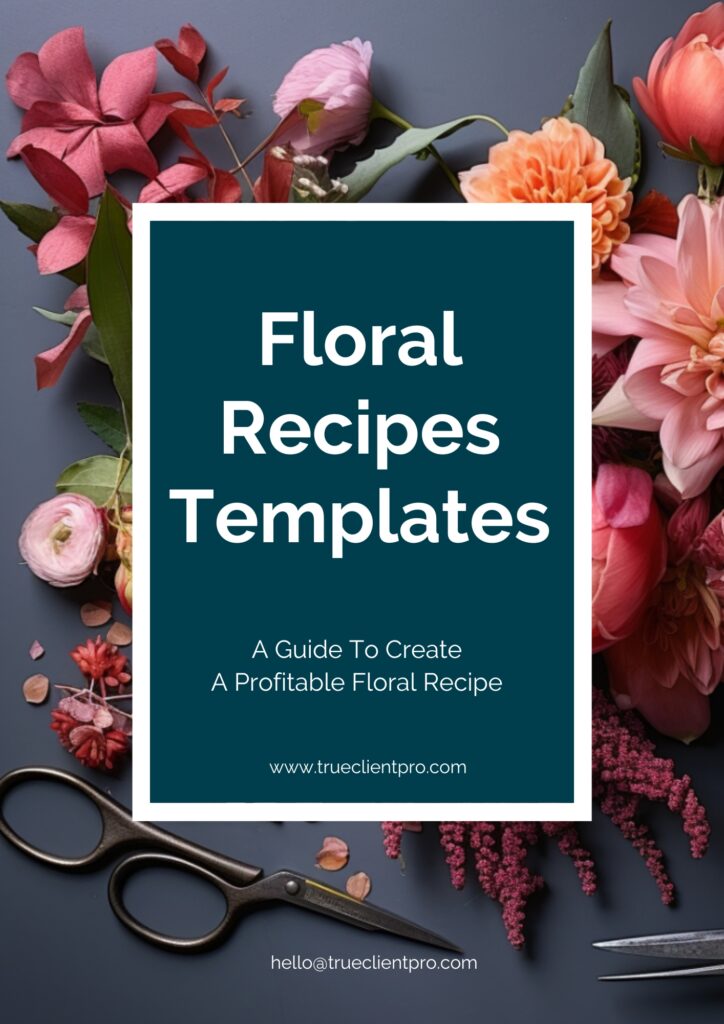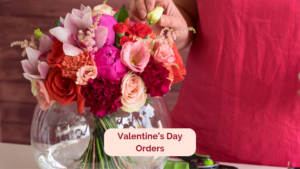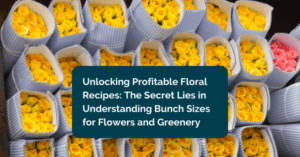Engaging in a floral hobby doesn’t guarantee a highly profitable event business; however, you can take steps to succeed. Adopting an executive mindset, setting realistic success standards, and reflecting on your motivations propel you forward. Creating a thriving floral design business does require effort; however, intentional effort and a commitment to learning from mistakes.
Consider Your Time And Energy Commitment For Running A Floral Business
First and foremost, decide how you will approach the floral design. If you have already started to monetize your hobby but still don’t know ultimately what your business will look like, it’s OK. There is no right or wrong way, and you don’t need to be in a hurry to figure it out as long as your business is scaled to meet your commitment level (e.g., not booking large events or orders if you’re not sure you have time or would enjoy working that much).
If you enjoy creating floral arrangements as a hobby, let them be your creative outlet. However, if you intend to run a business providing a service, you must adopt a CEO mindset. As a business owner, you must respect your time, investment, and energy because how you show up for your business will determine your level of success.

Define What A High Profitable Event Business Means to You to Scale Your Business
Success means different things to different people. You must define success on your terms and explain what that means regarding income, workload, workplace, and scale. Consider the following:
Revenue:
- How much do you want (or need) to make to justify your expense and time commitment?
The Hours You Work:
Given your current responsibilities, how many hours a day can you commit (keep in mind that running a floral business will involve much more than arranging flowers)?
- How many people will work with you?
- Do you like to have company at work or work alone?
- Are you prepared to be someone’s boss?
- The answers to these questions will, in part, determine the scale of your business.
Rented or studio space:
- Given your intended scale, how much space will you need?
- Do you have space at your home?
- How much does commercial real estate cost in your area (does it make sense to rent or buy studio space)?
- Can you run your business from home?
Growing flowers:
- Do you want to grow your own flowers to decrease shipping costs and time and add a more personal touch?
- Do you have the space to grow your own flowers?
Buying flowers:
- Will you buy flowers?
- Where will you buy flowers from?
- Will you buy it from a local wholesaler?
- Will you buy directly from the farm?
Sustainability:
- Will your flowers be eco-friendly?
- What materials will you use for bouquets and arrangements, and how do they impact the environment?
Event size and type:
- Will you arrange flowers for weddings, funerals, etc., or will you design for gifts? If you’ll service events, what size event can you realistically handle?
By aligning your aspirations with tangible objectives, you can achieve a more purposeful and fulfilling journey in the floral industry and avoid being overwhelmed and burnout.
Take a Hard Look at Expenses to Determine How Much Money You Can Realistically Make for a High Profitable Event Business
One crucial aspect of running a profitable floral design business is understanding how much personal income you aim to generate. This involves setting clear profit goals that align with your lifestyle, financial needs, and long-term aspirations. Consider factors such as:
- Personal financial obligations: Determine how much income you need to cover your living expenses, savings, investments, and other financial commitments.
- Desired lifestyle: Consider your desired standard of living and any luxuries or experiences you wish to afford for yourself and your family.
- Business reinvestment: Decide how much of your profits you want to reinvest into your business for growth, expansion, or improvements.
- Financial security: Factor in your need for financial stability, emergency funds, retirement savings, and insurance coverage.
Setting clear profit objectives helps you plan your revenue targets and pricing strategies to achieve them. At the same time, a detailed analysis of your costs, overhead expenses, profit margins, and pricing structures is necessary to ensure your business generates enough income to support your personal and professional goals.
Your Relationship With Money Will Dictate How You Run Your Business
You don’t have to be afraid of it as long as you start with a clear picture of what running your business will cost and what you expect. A healthy relationship with money will help you be a better community member, employer, and business owner. Regularly review and adjust your profit goals as your business evolves to ensure continued financial success and fulfillment as a floral business owner.
Assess and Evolve for a High Profitable Event Business and Enjoyable Lifestyle
Transitioning from a hobbyist to a profitable floral designer requires a series of perspective shifts, and they don’t stop after you’ve established your business. From starting small to expanding operations, from working at home to having a dedicated studio space, from a few small events to large weddings, remaining successful will require a continuous process of realignment and resetting. This adaptability ensures your business stays relevant and resilient in a competitive market. Designers can build successful and sustainable companies by adopting a business owner mindset, defining success parameters, evolving with the industry, and cultivating a healthy relationship with money. These shifts empower designers to pursue their passion while achieving their personal and professional goals in the floral industry.
For a High Profitable Event Business, always look at the bottom line of your costs, wastage, and highest expenses and see what can be reduced or cut out.
Here are some other questions that you can think on as learn to pivot your business from hobby to floral business.
- Am I treating my floral design as a hobby or a business?
- What habits do I have that reflect a hobby mindset?
- How can I start thinking like a CEO and business owner?
- Am I respecting my time, investment, and energy as a business owner should?
- What does success look like if this is just my hobby, and how does that differ if it’s a business?
Defining Success
- What does success mean to me personally and professionally?
- How much revenue do I want to generate monthly/yearly?
- How many hours am I willing to work each week to achieve my goals?
- What type of weddings or events do I enjoy working on the most (large, small, DIY)?
- Do I want to grow my own flowers, or will I focus on purchasing them?
- How eco-friendly or sustainable do I want my business to be?
- What kind of team or workspace aligns with my vision of success?
- Am I serving the right client base for my goals?
Evolving as a Business Owner
- What are the next steps to scale my floral business?
- Do I need to move from a home setup to a dedicated studio space?
- Am I saying yes to events or clients that align with my ideal customer profile?
- What changes can I make today to align my business with my long-term goals?
- How can I reset and realign when things don’t go as planned?
- Do I have a clear Ideal Customer Profile (ICP), and am I targeting the right audience?
Mindset Shifts and Money
- What is my current relationship with money?
- Do I see money as a neutral tool or something emotional?
- Am I pricing my services in a way that respects the value I bring?
- How can I improve my financial literacy as a business owner?
- Am I reinvesting in my business wisely to ensure growth and profitability?
- How can I use money to give back to my community and grow as a leader?
Self-Reflection for Growth
- What habits, beliefs, or attitudes are holding me back from growing my business?
- Who do I need to become to lead a successful floral design business?
- What steps can I take to learn from my mistakes and avoid repeating them?
- How can I balance creativity with strategic business decisions?
- Am I continuously learning and evolving to stay competitive in the floral industry?
- Do I have mentors, peers, or resources to guide me in my journey?
- What tools, like True Client Pro, can help streamline my business processes?
- How can I ensure my goals align with my personal values and business vision?
- What success stories or lessons can I learn from other florists?
By answering these questions, florists can clarify their goals, shift their mindset, and make informed decisions for their floral businesses.




